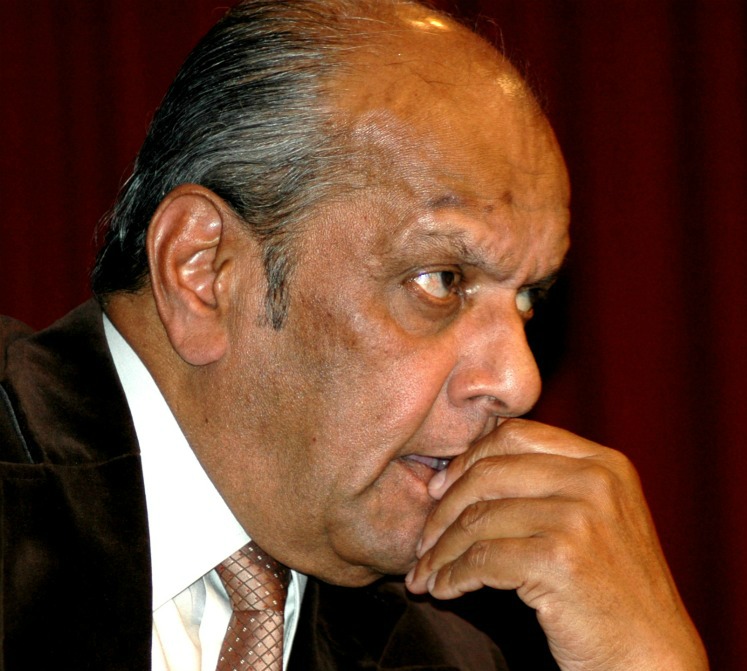Uncle Lawrence in the 1946 Naval Mutiny
Category:

Reginald was born in Lahore before Partition. He writes books on various subjects pertaining to South Asia. A former London journalist, he now lives in Mid Wales with his actor wife Jamila. His latest book is Shaheed Bhagat Singh and the Forgotten Indian Martyrs, Abhinav Publications, New Delhi. A member of the Society of Authors, he is a Fellow of the Royal Society of Arts.
My uncle Lawrence Massey, my mother’s cousin, was a tough type. He ran away from Lahore to Bombay in the 1920s.
Somehow, he managed to join the Mogul Line, a British-owned steamship company that specialised in taking Indian Muslims to the port of Jeddah, from where they proceeded to Mecca for the Haj. He became an engineer on a steamship called the SS Alavi, though it is doubtful if he ever had a steamship-engineering certificate.
With the outbreak of World War II in 1939, the British had to expand the Royal Indian Navy, mainly because of the impending Japanese threat to British colonies in South East Asia. Also, there were dark rumours that German submarines were marauding in the Arabian Sea. The Royal Navy was too tied up with protecting British waters. In other words, there was a dire need for men who knew the Arabian Sea, the Red Sea and the Persian Gulf. Thus, Lawrence Massey wrangled a commission in the Royal Indian Navy only because the British captain of the SS Alavi gave him a glowing report. Now he had ‘made it'.
In war, casualties are to be expected, and so promotions are rapid. Soon, Uncle Lawrence was expecting a promotion to Lieutenant Commander. But he began to show sympathy for the Indian ratings when he observed how they were treated by his ‘brother officers' who were British. At first, he kept aloof and pretended not to notice. Then the fateful happened.
In those days, many Punjabi Muslims from the Rawalpindi district were ratings in the Royal Indian Navy. One Leading Signalman named Pannu Khan was, with Petty Officer Madan Singh, busy hatching a plot to mutiny. They were particularly incensed because Commander King, who commanded HMIS Talwar, had shouted at the Indian ratings and called them ‘sons of coolies and bitches'. These men from honourable families could not take this language lying down.
For a couple of weeks, Pannu Khan had been making radio contact with ratings on other Royal Indian Navy ships in Bombay, Cochin, Madras and Karachi, Vizagapatnam, Calcutta and Chittagong. There were many supporters for a mutiny. But the opinion was that they needed an Indian officer or a group of dissatisfied Indian officers to lead the mutiny. Pannu Khan knew that Uncle Lawrence, who was known as Massey Sahib, was a Lahori, and Khan had noticed that Massey Sahib too disliked Commander King.
Very discreetly, Khan approached the subject with Massey Sahib. The maverick Uncle Lawrence had been offered what he believed to be his main role in the high drama of life. He hated King, who obviously despised Indian officers more than he despised Indian ratings. King couldn't be openly rude to his Indian officers but he displayed his contempt and disdain in other ways. Hence, Massey Sahib informed the ringleaders that he would be with them whenever they wanted him.
On February 18, 1946, the ratings mutinied. At the instigation of Massey Sahib, they simultaneously arrested Commander King and four other British officers. They were handcuffed and locked up in the wardroom (officers' mess). A guard was placed over them. Within minutes, the flags of the Congress Party, the Muslim League, and the Communist Party of India were hoisted on the Talwar. The Union Jack was joyously burnt.
Pannu Khan radioed all ships and shore establishments, and they followed the Talwar's example. The Royal Indian Navy was renamed the ‘Indian National Navy'. The mutiny now took on the appearance of a national patriotic insurrection. But hardly any Indian officers joined the ratings. Interestingly, many units of the Royal Indian Air Force also immediately followed the Royal Indian Navy's example. A total of 78 Royal Indian Navy ships and shore establishments were in open mutiny. They ranged from Karachi, where the Royal Indian Navy's flagship HMIS Hindustan, an ageing destroyer, was at anchor, to the far off port of Chittagong near Burma.
There was consternation, even panic, in New Delhi and London. Emperor George VI ordered the Royal Navy stationed at Trincomalee in Ceylon to despatch a cruiser and a squadron of destroyers to quell the mutiny and, if necessary, to sink the entire Royal Indian Navy.
But even more worried were the Congress Party and the Muslim League. They were on the point of getting Independence and could not be seen to side with mutineers. Sardar Patel was despatched to talk to the mutineers, and he asked them to lay down their arms.
Indian historians have shamelessly ignored the Royal Indian Navy mutiny, which, in fact, spelt out to the British that their tenure in South Asia had finally run out. The mutineers were let down by both the Congress and the Muslim League, since both parties were hankering for power which soon came their way. The only party that raised its voice for the insurrectionists was the Communist Party of India. One man's mutineer is another man's revolutionary hero.
The mutineers were not shot. Instead, they were court-martialled and discharged dishonourably. This was the deal that Patel had brokered with the British. Thus, Uncle Lawrence found himself on the streets of Bombay without a job, humiliated, without money and, worse, his name expunged from the records of the Royal Indian Navy. His marriage had already ended. He had nothing. We do not know what happened to him after that.
© Reginald Massey 2014
Comments
Add new comment